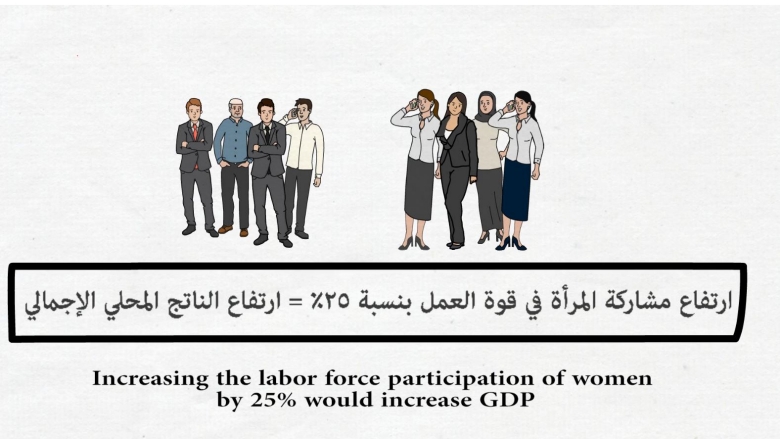Gender equality is smart economics, contributing to poverty reduction, strengthening resilience and boosting shared prosperity. In the Middle East and North Africa (MENA) region, women only generate 18 percent of GDP, compared to a world average of 37 percent, and increasing female labor force participation to the levels of men could boost regional GDP by 47 percent. Today, the majority of women in MENA are jobless, that is facing high inactivity and high unemployment rates. Only 19% of working age women participate in the labor force in MENA, compared to 46% in middle-income countries and 52% in LAC. In Mashreq countries, Jordan has one of the lowest female labor participation rates in the world with 14% compared to 19% in Iraq and 23% in Lebanon.
Empowering women and girls has an intrinsic value and is instrumental to achieve more inclusive institutions, sound policies, and effective development outcomes. In the Mashreq countries, important gains have been made in women’s access to education and health, but persistent challenges remain in the areas of women’s economic opportunities, voice and agency.
Working towards this goal, the World Bank, International Finance Corporation (IFC) and the Government of Canada have come together to support Mashreq Governments’ efforts towards enhancing women’s economic empowerment as a catalyst towards more inclusive, sustainable and peaceful societies, where economic growth benefits all.
This high-level conference aimed to elevate the dialogue and overall awareness of the importance and benefits of enhanced economic participation of women in the Mashreq region, and create a space for the Governments of Lebanon, Jordan and Iraq, in collaboration with the private sector, civil society and development partners, to share their commitments to this agenda. Specifically, the conference aimed to:
- Highlight key challenges and constraints to women’s economic empowerment in the Mashreq from a holistic perspective bringing in experiences from the policy side, from private sector and from civil society;
- Identify best practices from different types of stakeholders that address challenges and enhance women’s economic empowerment and participation in the labor force in the Mashreq, and discuss how they can be scaled up and replicated;
- Announce specific country level commitments to enhance women’s economic empowerment that each country will focus on, with clear monitoring and reporting mechanisms (progress to be reported preferably on a yearly basis); and
- Launch the “Mashreq Gender Financing Facility” aimed at supporting client countries in achieving their commitments towards enhancing women’s economic empowerment.
It is proposed that this conference become an annual event to review progress and make new commitments each year to advance women’s economic empowerment.
